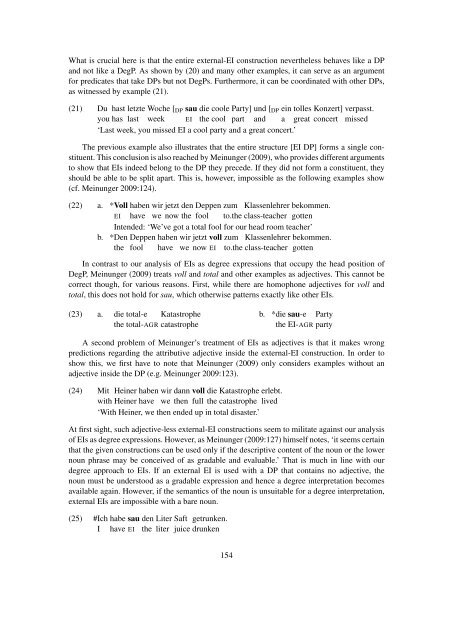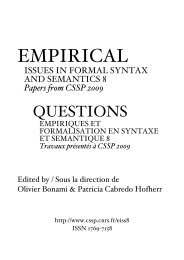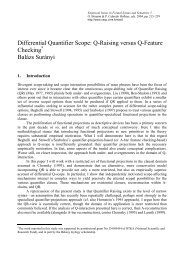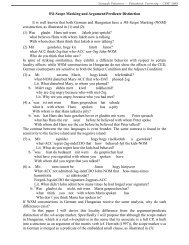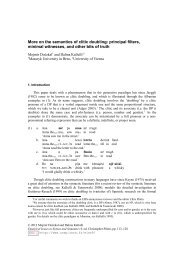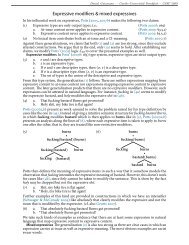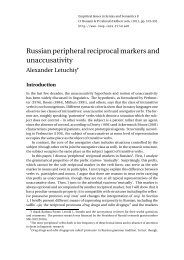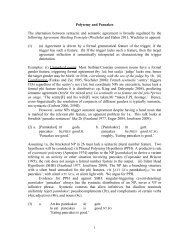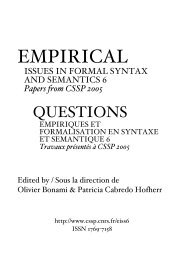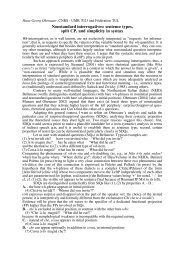Empirical Issues in Syntax and Semantics 9 (EISS 9 ... - CSSP - CNRS
Empirical Issues in Syntax and Semantics 9 (EISS 9 ... - CSSP - CNRS
Empirical Issues in Syntax and Semantics 9 (EISS 9 ... - CSSP - CNRS
Create successful ePaper yourself
Turn your PDF publications into a flip-book with our unique Google optimized e-Paper software.
What is crucial here is that the entire external-EI construction nevertheless behaves like a DP<br />
<strong>and</strong> not like a DegP. As shown by (20) <strong>and</strong> many other examples, it can serve as an argument<br />
for predicates that take DPs but not DegPs. Furthermore, it can be coord<strong>in</strong>ated with other DPs,<br />
as witnessed by example (21).<br />
(21) Du hast letzte Woche [ DP sau die coole Party] und [ DP e<strong>in</strong> tolles<br />
you has last week EI the cool part <strong>and</strong> a great<br />
‘Last week, you missed EI a cool party <strong>and</strong> a great concert.’<br />
Konzert]<br />
concert<br />
verpasst.<br />
missed<br />
The previous example also illustrates that the entire structure [EI DP] forms a s<strong>in</strong>gle constituent.<br />
This conclusion is also reached by Me<strong>in</strong>unger (2009), who provides different arguments<br />
to show that EIs <strong>in</strong>deed belong to the DP they precede. If they did not form a constituent, they<br />
should be able to be split apart. This is, however, impossible as the follow<strong>in</strong>g examples show<br />
(cf. Me<strong>in</strong>unger 2009:124).<br />
(22) a. *Voll haben wir jetzt den Deppen zum Klassenlehrer<br />
EI have we now the fool to.the class-teacher<br />
Intended: ‘We’ve got a total fool for our head room teacher’<br />
b. *Den Deppen haben wir jetzt voll zum Klassenlehrer<br />
the fool have we now EI to.the class-teacher<br />
bekommen.<br />
gotten<br />
bekommen.<br />
gotten<br />
In contrast to our analysis of EIs as degree expressions that occupy the head position of<br />
DegP, Me<strong>in</strong>unger (2009) treats voll <strong>and</strong> total <strong>and</strong> other examples as adjectives. This cannot be<br />
correct though, for various reasons. First, while there are homophone adjectives for voll <strong>and</strong><br />
total, this does not hold for sau, which otherwise patterns exactly like other EIs.<br />
(23) a. die total-e Katastrophe<br />
the total-AGR catastrophe<br />
b. *die sau-e Party<br />
the EI-AGR party<br />
A second problem of Me<strong>in</strong>unger’s treatment of EIs as adjectives is that it makes wrong<br />
predictions regard<strong>in</strong>g the attributive adjective <strong>in</strong>side the external-EI construction. In order to<br />
show this, we first have to note that Me<strong>in</strong>unger (2009) only considers examples without an<br />
adjective <strong>in</strong>side the DP (e.g. Me<strong>in</strong>unger 2009:123).<br />
(24) Mit He<strong>in</strong>er haben wir dann voll die Katastrophe erlebt.<br />
with He<strong>in</strong>er have we then full the catastrophe lived<br />
‘With He<strong>in</strong>er, we then ended up <strong>in</strong> total disaster.’<br />
At first sight, such adjective-less external-EI constructions seem to militate aga<strong>in</strong>st our analysis<br />
of EIs as degree expressions. However, as Me<strong>in</strong>unger (2009:127) himself notes, ‘it seems certa<strong>in</strong><br />
that the given constructions can be used only if the descriptive content of the noun or the lower<br />
noun phrase may be conceived of as gradable <strong>and</strong> evaluable.’ That is much <strong>in</strong> l<strong>in</strong>e with our<br />
degree approach to EIs. If an external EI is used with a DP that conta<strong>in</strong>s no adjective, the<br />
noun must be understood as a gradable expression <strong>and</strong> hence a degree <strong>in</strong>terpretation becomes<br />
available aga<strong>in</strong>. However, if the semantics of the noun is unsuitable for a degree <strong>in</strong>terpretation,<br />
external EIs are impossible with a bare noun.<br />
(25) #Ich<br />
I<br />
habe sau den Liter Saft getrunken.<br />
have EI the liter juice drunken<br />
154


